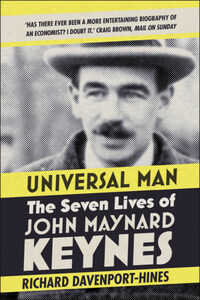William Collins
An imprint of HarperCollins Publishers,
1 London Bridge Street
London SE1 9GF
www.WilliamCollinsBooks.com
First published in Great Britain by William Collins in 2015
Copyright © Richard Davenport-Hines 2015
Richard Davenport-Hines asserts the moral right
to be identified as the author of this work
A catalogue record for this book is
available from the British Library
Cover photograph © Private Collection/Roger-Viollet, Paris/Bridgeman Images
Designed by Kate Gaughran
All rights reserved under International and Pan-American Copyright Conventions. By payment of the required fees, you have been granted the non-exclusive, non-transferable right to access and read the text of this e-book on screen. No part of this text may be reproduced, transmitted, down-loaded, decompiled, reverse engineered, or stored in or introduced into any information storage retrieval system, in any form or by any means, whether electronic or mechanical, now known or hereinafter invented, without the express written permission of HarperCollins.
Source ISBN: 9780007519804
Ebook Edition © March 2015 ISBN: 9780007519811
Version: 2015-09-15
For Selina Hastings and Jonno Keates and again to the gentle memory of Cosmo Davenport-Hines
Good work is not done by ‘humble’ men. It is one of the first duties of a professor, for example, in any subject, to exaggerate a little both the importance of his subject and his own importance in it. A man who is always asking ‘Is what I do worthwhile?’ and ‘Am I the right person to do it?’ will always be ineffective himself and a discouragement to others. He must shut his eyes a little, and think a little more of his subject and himself than they deserve.
G. H. Hardy
It is, I think, of the essential nature of economic exposition that it gives, not a complete statement, which, even if it were possible, would be prolix and complicated to the point of obscurity but a sample statement, so to speak, out of all the things which could be said, intended to suggest to the reader the whole bundle of associated ideas, so that, if he catches the bundle, he will not in the least be confused by the technical incompleteness of the mere words which the author has written down … This means, on the one hand, that an economic writer requires from his reader much goodwill and intelligence and a large measure of co-operation; and, on the other hand, that there are a thousand futile, yet verbally legitimate, objections which an objector can raise. In economics you cannot convict your opponent of error – you can only convince him of it.
Maynard Keynes
What do we do? What is the remedy? It would be most inappropriate for me to stand up here and tell you what Keynes would have thought. Goodness knows he would have thought of something much cleverer than I can think of.
Roy Harrod
1: Maynard Keynes as a figure of intellectual authority and cultural benevolence, surrounded by rare books in his Bloomsbury house. (Tim Gidal/Picture Post/Getty Images)
2: Keynes, aged about fourteen, shortly before starting at Eton, where he won most school prizes and learnt the rudiments of statecraft. (Archives Centre, King’s College, Cambridge; by kind permission of Susannah Burn)
3: ‘The peerless Maynard’ was by his mid-thirties chief of the Treasury department responsible for the London government’s external finances and inter-Allied finance. (Archives Centre, King’s College, Cambridge)
4: Keynes attended the Genoa Conference, which was charged with the conciliation of European capitalism with Russian communism, as special correspondent of the Manchester Guardian. (Private Collection/© Leemage/Bridgeman Images)
5: Duncan Grant with Keynes. In 1908 Keynes wrote to Grant: ‘I want to see you again dreadfully and find that even in the midst of a crowd I am continually sinking into a trance and thinking about you.’ (Private Collection/Bridgeman Images)
6: Bertrand Russell, Keynes and Lytton Strachey in 1915: three Apostles, members of Cambridge’s Immoral Front, conscientious objectors, skirmishers in Bloomsbury’s cultural vanguard. (© National Portrait Gallery, London)
7: Keynes addressing the Bretton Woods monetary and financial conference in 1944. He performed there, he said, the combined tasks of economist, financier, politician, propagandist, lawyer, prophet and soothsayer. (akg-images)
8: Lydia Lopokova and Keynes on their balcony overlooking Gordon Square in 1940. Her protective love and gaiety kept him alive, and enabled his greatest accomplishments. (© Hulton-Deutsch Collection/CORBIS)
Seven snapshots of a Universal Man:
An intellectual in his twenties in college rooms in Cambridge, hunched forward listening, lolling back in reflection, then standing on a hearth-rug speaking, eager, testing, provoking, always in passionate, lucid paragraphs, to the secretive discussion group called the Apostles, offering new intellectual or ethical systems, and later acting on his belief in the virtues of immorality, having energetic bouts of illegal, risky sex with men from all classes whom he picked up in museums, saunas, railway stations and streets.










